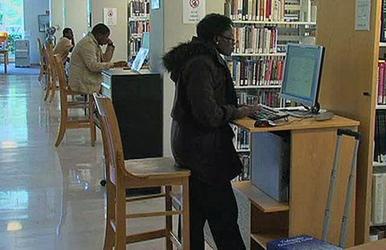
The Obama administration offered financial relief last month to one million college students and recent graduates struggling to make student loan payments, as tuition costs rapidly rise. Administrators at a community college in Virginia have watched the tuition-loan crisis building and have launched their own program to help head it off.
Navy veteran Reason Chandler wanted to earn a college degree after leaving the military, but he needed the money to pay for it. So, like almost half of the 46,000 students at Tidewater Community College in Virginia, he applied for financial aid, taking out loans and grants to help fund his education.
"I am 26, so it gives me a little more life experience than someone who is 18 and directly from high school," said Chandler.
To get their loan checks, Tidewater students must complete a current budget of income and expenses, and a projected post-graduation budget, based on what that first job might pay. That way, school administrators say, a student will know better what money is left to pay the debt.
"My starting salary for urban and regional planning is around $36,000 to $40,000 a year," said Chandler. "I look back at how much I borrow and how much my payments would be. My payments would be about $136 a month."
That's reasonable, said Tidewater Community College President Deborah DiCroce.
"Take out a mortgage to buy a house, that very next month that first payment is due. Same thing with a car payment. That is not true with this. There is too much lag time and what we are trying to do is close the gap so that the student understands it is not a handout. It is not free, and on top of that you are going to owe that money whether you are successful in reaching your goal or not," said DiCroce.
DiCroce said Tidewater tied student budget plans to financial aid packages to help avert the crisis that administrators saw growing. As the economy failed, Tidewater's enrollment swelled, with more students seeking the low-cost education of a community college. Also on the rise is the number of students using debt to finance college.
"Last year, graduates who took out loans left college owing an average of $24,000," said Obama. "Student loan debt has now surpassed credit card debt, for the first time ever."
Late last month, President Obama announced a debt-relief plan for America's college students and recent graduates. Beginning next year, the "pay as you earn" plan caps loan payments at 10 percent of discretionary income, and forgives the debt after 20 years of repayment.
"This is one way to deal with it. And maybe that is the only way we have to deal with it right now, but for me I prefer to look at it on the front end," said DiCroce.
Chandler said he is glad he did the financial prep work beforehand, and said he borrowed less. After all, he told us, he has graduate school to pay for next.
New US law cuts out private lenders for student loans
Fresh out of college, and in debt
Obama's 'blueprint for reform' in education goes to Congress
Higher education in US: what does it cost?
(來源:VOA 編輯:Rosy)
